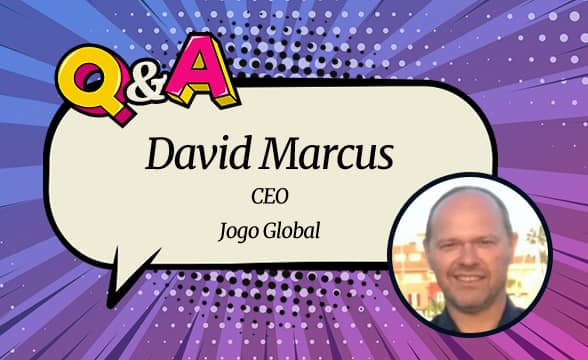Jogo Global, now with a solid grounding in the UK and setting its sights on growth further afield, has made great strides thanks to a differentiated product portfolio built on gamification. The fast-growing platform provider and casino content developer has identified player engagement as a vital aspect of slot development and is set to lead from the front in this space in 2022.
In this exclusive interview with Gambling News, David Marcus, CEO, discusses the ways in which Jogo are prioritizing gamification at a time when the importance of player engagement cannot be overstated.
The advance in gamification is one of 2021’s success stories – what extra steps can be taken to replicate that success in 2022?
David Marcus (DM): The big difference this year is that gamification has to be a core element of a business strategy – it is not an add-on. Too many people approach gamification as an afterthought and it is to their detriment. Creating an aesthetically pleasing game is relatively easy in 2022 – it is the mechanics behind that game, whether they be progressive jackpots, tournaments, missions, or bonus tools, that are the difference between its success and failure. As such, they need to be included in the initial plan – gamification should be included from the ground up as part of a game’s foundation. This then leads to increased engagement, which is always paramount when creating unique experiences like ours.
What gamification features do you feel will be most prominent in the months to come, and why?
DM: From our perspective, there are two elements that will feature prominently this year: jackpots and tournaments. Players want the opportunity to see a big win, to see the jackpot counter ticking. This applies not only to progressive jackpots but to must-drop jackpots, and both are highly effective methods of keeping players engaged in a game. The tournament aspect taps into the fact that people like to play with and against their friends.
I think there has recently been a bit of a lull in terms of social interaction between players, whether that be in direct play or through leader boards – Jogo acknowledges the importance of peer-to-peer interaction during play. The social element of gaming is vital to maintaining a high level of engagement, and a focus on this in the form of tournaments and missions is where Jogo differentiates from the competition.
How does gamification compare to other promotional tools available – in what ways does it outdo them?
DM: Signup bonuses are an established facet of iGaming but they are very generic and tend not to take the individual player into account. Gamification is player-specific, a dedicated service rather than something broad for everyone. We tailor our platform at Jogo to make it as personal as possible, by creating campaigns unique to an individual player, for example. Pushing campaigns through a gamification platform allows us to craft an experience that feels unique to the individual. This is what sets Jogo apart in competitive slot markets: the player feels like they are being cared for and they subsequently become more engaged, as a result.
This also allows us to better adhere to Gambling Aware elements. Engagement drives all of our promotional tools – creating a long-lasting relationship with a player, rather than a one-time bonus bet, is much more beneficial. Engagement has to be at the heart of any promotional efforts we make, and gamification is one of the most engaging aspects of slots development at the moment.
In what ways is gamification set to take player engagement to the next level this year?
DM: Gamification prioritises the player in a way unseen in other areas of iGaming: we take care of them with a VIP service. Delegating resources to an individual player, rather than the mass majority, creates an experience with a personal touch that cannot be replicated elsewhere. This can be done through campaigns; if a player triggers something within their profile, it allows us as a company to either offer that player something or create a call to action that will ultimately benefit the player in some way.
The omnichannel experience will be vital going into 2022 – how does gamification feed into this?
DM: Even if an operator does not have a full omnichannel experience, gamification can offer elements of one by tying together products that would otherwise have been disparate. Gamification can be the driving force that jumpstarts the omnichannel experience. What Jogo has the ability to do for land-based customers is offer them that omnichannel experience: combining the land-based and online experiences to allow the player to continue their journey.
The ability to pick up where they left off offers a level of continuity to gameplay that adds value to the whole experience. In addition, the possibility for more tangible rewards presents itself here: real prizes, instead of digital ones, create another level of immersion that, again, highlights the importance of player engagement.
Have you seen gamification succeed in other sectors in ways that iGaming could emulate?
DM: In the financial sector, cash incentives for credit cards have been an established facet for many years. It is very common and, in such a competitive global market, people are trying to find that way of driving traffic to their brand instead of someone else’s. Other sectors offer free gifts, but where gamification differs is that it is more about offering players the opportunity to win. It’s not a short-lived reward, but a tangible benefit. It is about ascribing meaning to their journey. Gamification is inherently not about things with monetary value but about an experience – the player wants to feel like they are part of a journey and that a game provider is listening to what they want.


